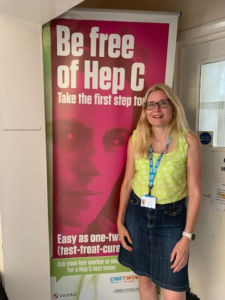World Hepatitis Day 2022 aims to raise awareness of hepatitis and highlight the importance of testing and treatment.

Natasha Sanderson, Viral Hepatology Nurse
There are several types of hepatitis, but hepatitis C is the most common type of viral hepatitis in the UK and is usually spread through blood-to-blood contact with an infected person, such as through sharing needles used to inject drugs.
To mark World Hepatitis Day we spoke to Natasha Sanderson, Viral Hepatology Nurse.
“I love being a Viral Hepatology Nurse because overcoming the challenges of the barriers to healthcare experienced by an often disenfranchised patient group is very fulfilling.
“I used to work in drug and alcohol services and I was fascinated by the work of the hepatology nurses who held clinics there. It amazed me that a virus which can threaten lives was so easily treated.”
143,000 people are estimated to be infected with hepatitis C in the UK, yet direct acting antivirals are available that offer a greater than 95% chance of success.
“For many patients, treating their hepatitis C is a springboard for steps into drug and alcohol recovery,” continues Natasha. “I love that I get to work in a variety of settings within the hospital and community; often with the hardest to reach and most vulnerable of society. Building rapport and trust with patients who have lost faith in the system is very rewarding.”
Hepatitis C often causes no noticeable symptoms, or flu-like symptoms that are easily attributable to other illnesses. As a result, hepatitis C is often referred to as the ‘silent epidemic’ with up to two thirds of people living with the virus unaware they’re infected.
Of those infected, around one in four people will fight off the infection and be free of the virus, but in the remaining cases, it’ll stay in the body for many years causing cirrhosis and liver failure.
Testing for hepatitis C is easy and available through drug and sexual health services as well as via your GP. There is no vaccine for hepatitis C, but it can be treated with medicines that stop the virus from multiplying.
“The best thing about my job is informing patients of the good news when they are clear of the virus,” says Natasha. “There is so much delight and gratitude. Every person we successfully treat is one more person safe from the devastating effects of the virus.”
The WHO’s global health strategy aims to eliminate hepatitis by 2030. This requires reducing new infections of hepatitis B and C by 90% and ensuring that at least 80% of those eligible for treatment receive it. In turn, the strategy will reduce hepatitis related deaths from liver cirrhosis and cancer by 65%.
Visit WorldHepatitisDay.org to pledge your support.
We work in partnership with our colleagues at University Hospital Sussex to deliver our viral hepatology service. If you would like to refer a patient or would like more information please contact the team on uhsussex.viralhepatitisteam@nhs.net.
More information:
Hepatitis is the term used to describe inflammation of the liver. It’s usually the result of a viral infection or liver damage caused by drinking alcohol. For more information visit nhs.uk/conditions/hepatitis.
Risk factors for hepatitis C include:
– Intravenous and other drug use
– Homelessness
– Time in prison
– Workplace needle stick injuries
– Unprotected sex with multiple partners
– Unlicensed tattoos or piercings
– Dental or medical procedures abroad.
Symptoms can include:
– Flu-like symptoms
– Feeling tired all the time
– Loss of appetite
– Stomach ache
– Feeling and being sick
